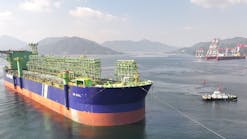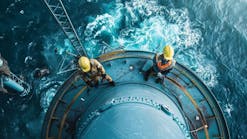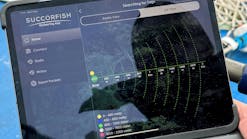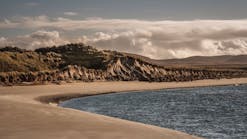Denmark's leading offshore fabricator is Bladt Industries, based in northern Jutland. Over the past three years, the company has supplied a variety of platforms and components for local North Sea projects. These include:
- Skidding structure and deck for BP Norge's Valhall water injection scheme - total weight 2,500 tonnes, including outfitting
- Two jackets, flare, and bridge for Mærsk's Halfdan Phase III development
- 1,055-tonne water injection module for Mærsk's Dan FF platform
- Two virtually identical wellhead platforms for the Dong-operated Cecilie and Nini fields
- 670-ton substation for Nysted windfarm offshore southern Denmark.
Danish offshore activity has since tailed off, although Mærsk has announced plans for a new unmanned STAR-type platform for its Valdemar field extension. Dong is also considering a new multi-field project close to the median line with Norway. However, according to Carsten Nielsen, Bladt's sales and project director, "We have decided that we can't survive simply on Danish offshore contracts. We must spread out to address the whole of the North Sea."
Bladt's yard on the outskirts of Aalborg extends over an area of 27 acres, and can accommodate loads of up to 5,000 tonnes at its quayside. The company tries to maintain a permanent workforce of 500. This has proved sufficient in the past for managing up to three construction jobs simultaneously, with subcontract personnel brought in if required. Bladt is also working increasingly with Polish partners through its subsidiary company in Szeczin, which can provide specialist steelwork fabrication of items such as pressure vessels and braces.
null
Aerial view of Bladt's 27 acre site outside Aalborg.
null
Smaller unmanned platforms or modules weighing up to 4,000 tonnes are Bladt's specialty. "Heavier structures are in general a bit too complicated for us to manage," Nielsen says, "although we have demonstrated our capability in EPC work through Cecilie and Nini."
He sees possibilities for four to six new platforms per year across the North Sea. "We see prospects for marginal field developments and also for facilities such as platform injection modules to boost tail-end production on maturing fields. Much of this activity is being driven by independent newcomers, which do not have a history of working with any particular yard. We would like to be their alliance partner. In the UK southern gas basin, operators seem to prefer working with UK yards. We feel we could break this mold, however."
Another group of European and Canadian independents are looking to exploit neglected discoveries in waters close to the UK/Norwegian median line.
"We see good chances to work with both small and mid-sized companies," Nielsen adds. "They want to develop fields in this region, and they want to do it fast track, but they are also conscious of cost."
Bladt hopes to bid for work on much larger field extension programs in the Norwegian sector, such as the Draugen, Ekofisk, and Statfjord gas projects. New subsea developments also open up possibilities: "We could build fabrication skids for subsea structures assembled by main contractors such as Aker-Kværner, but we could also handle templates and manifolds ourselves."
The company is investigating business areas such as deck sections for FPSOs and platform decommissioning. "For this type of work, you need a very big area, and you need partners, as this is a very specialized activity," Nielsen adds. "However, we do have in place at our yard all the welding procedures needed for almost any kind of task, as well as all necessary back-up skills via our setup in Poland. Project management is one of our biggest selling points. We are on schedule with our deliveries – which is not always easy – as many other contractors are involved in offshore construction jobs. We also perform commissioning and testing of equipment ourselves prior to delivery, which in general cuts offshore hook-up activities to a minimum."







